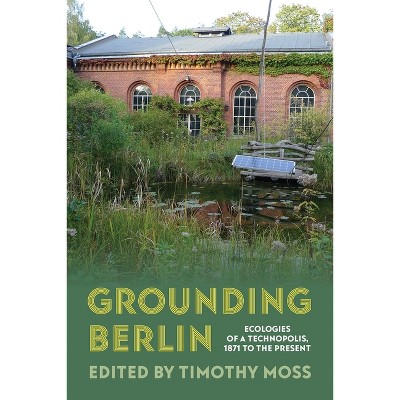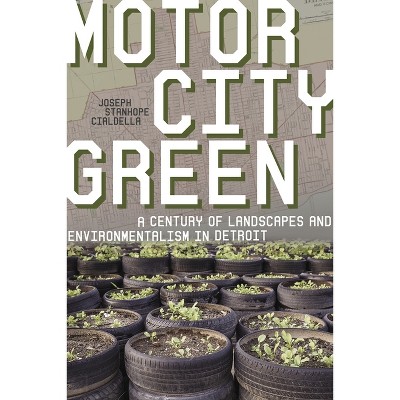The Age of Smoke - (History of the Urban Environment) by Frank Uekötter (Paperback)

$54.84 sale price when purchased online
$60.00 list price
Target Online store #3991
About this item
Highlights
- In 1880, coal was the primary energy source for everything from home heating to industry.
- About the Author: Frank Uekötter is professor of environmental humanities at the University of Birmingham.
- 336 Pages
- History, Europe
- Series Name: History of the Urban Environment
Description
About the Book
The Age of Smoke provides an original, comparative history of environmental policy development in Germany and the United States from 1880 to 1970, and the rise of civic activism to combat air pollution.Book Synopsis
In 1880, coal was the primary energy source for everything from home heating to industry. Regions where coal was readily available, such as the Ruhr Valley in Germany and western Pennsylvania in the United States, witnessed exponential growth-yet also suffered the greatest damage from coal pollution.These conditions prompted civic activism in the form of u201canti-smokeu201d campaigns to attack the unsightly physical manifestations of coal burning. This early period witnessed significant cooperation between industrialists, government, and citizens to combat the smoke problem. It was not until the 1960s, when attention shifted from dust and grime to hazardous invisible gases, that cooperation dissipated, and protests took an antagonistic turn.
The Age of Smoke presents an original, comparative history of environmental policy and protest in the United States and Germany. Dividing this history into distinct eras (1880 to World War I, interwar, post-World War II to 1970), Frank Uekoetter compares and contrasts the influence of political, class, and social structures, scientific communities, engineers, industrial lobbies, and environmental groups in each nation. He concludes with a discussion of the environmental revolution, arguing that there were indeed two environmental revolutions in both countries: one societal, where changing values gave urgency to air pollution control, the other institutional, where changes in policies tried to catch up with shifting sentiments.
Focusing on a critical period in environmental history, The Age of Smoke provides a valuable study of policy development in two modern industrial nations, and the rise of civic activism to combat air pollution. As Uekoetter's work reveals, the cooperative approaches developed in an earlier era offer valuable lessons and perhaps the best hope for future progress.
Review Quotes
Ambitious, clearly written, and thoroughly documented . . . a worthy addition to any environmental historian's bookshelf.-- "Environmental History"
An ambitious work . . . uniquely expansive. The expanse [leads] directly to his interesting conclusions. After decades of writing municipal and regional histories, it is time for environmental historians to broaden their scope, and to think about the age of environmentalism in the way that Uekoetter approaches 'The Age of Smoke.'-- "Business History Review"
Elegantly written. The myth Uekoetter most effectively debunks is the belief that successful pollutant control only began with the modern environmental movement. He is one of several contemporary environmental historians looking seriously at Progressive-Era efforts at conservation, preservation, and protoenvironmentalism to make the link between earlier efforts and present day ones.-- "German Studies Review"
Marks a minor victory in environmental historians' long struggle for relevance. . . .What distinguishes 'The Age of Smoke' from other pollution histories is a reliance on organizational and comparative approaches. . . . well-written and meticulously researched.-- "German History"
Offer[s] unique insights . . . Environmentalists as well as those with interests in German and U.S. history will gain much from this work.-- "Choice"
Perhaps most notable is Uekoetter's eloquent historical critique of the instinctive tendency among some environmentalists to view industry as an implacable foe rather than potential collaborator in the reduction of air pollution. Industrialists and engineers often acted as valued partners in smoke-abatement efforts; the account he presents is therefore not one that pits ecological concerns firmly against economic interests. If there is a lesson to be learned from the 'age of smoke, ' it is, according to Uekoetter, the importance of compromise and cooperation achieving real environmental improvements.-- "Central European History"
Readily reveals the remarkable amount of research Uekoetter undertook on two continents in preparing this book. Simply in undertaking this large and difficult task, Uekoetter's work is an accomplishment.-- "Technology and Culture"
This book is a major achievement. It has much to offer environmental historians, and also those working on the functions of government in Germany and the United States. Uekoetter has mastered masses of archival material, without losing sight of his main arguments. He uses concepts drawn from sociology and political science to enhance our understanding of environmental policies.-- "Minerva"
This book is based on an immense amount of source and literature research and is well written. In sum, Uekoetter's book fills a big void in environmental history.-- "H-German"
This book proves to be extremely rich in information on a problem still largely absent from French historiography of the twentieth century and increases the knowledge of the real fight against pollution before the environmental turn of 1970. It offers a nuanced and renewed vision of the role of the industrialists, [who were] not necessarily opposed to the fight against air pollution when they were able to make a profit. The diversity of the actors studied is worth highlighting; the geographic differences are also very interesting . . . . The economic and industrial boom of 1880-1970 not only 'went up in smoke, ' it generated numerous documents on the environmental flip side of the coin of 'progress' and 'growth' which still need to be explored.-- " Annales. Histoire, Sciences Sociales"
About the Author
Frank Uekötter is professor of environmental humanities at the University of Birmingham. He is the author of more than a dozen books on a broad range of environmental, political, and socioeconomic issues. Since October 2021, he is principal investigator of the global history project "The Making of Monoculture" with generous support from a European Research Council Advanced Grant.Dimensions (Overall): 9.32 Inches (H) x 6.5 Inches (W) x .85 Inches (D)
Weight: 1.14 Pounds
Suggested Age: 22 Years and Up
Number of Pages: 336
Genre: History
Sub-Genre: Europe
Series Title: History of the Urban Environment
Publisher: University of Pittsburgh Press
Theme: Germany
Format: Paperback
Author: Frank Uekötter
Language: English
Street Date: February 15, 2009
TCIN: 93676195
UPC: 9780822960126
Item Number (DPCI): 247-11-2582
Origin: Made in the USA or Imported
If the item details aren’t accurate or complete, we want to know about it.
Shipping details
Estimated ship dimensions: 0.85 inches length x 6.5 inches width x 9.32 inches height
Estimated ship weight: 1.14 pounds
We regret that this item cannot be shipped to PO Boxes.
This item cannot be shipped to the following locations: American Samoa (see also separate entry under AS), Guam (see also separate entry under GU), Northern Mariana Islands, Puerto Rico (see also separate entry under PR), United States Minor Outlying Islands, Virgin Islands, U.S., APO/FPO
Return details
This item can be returned to any Target store or Target.com.
This item must be returned within 90 days of the date it was purchased in store, shipped, delivered by a Shipt shopper, or made ready for pickup.
See the return policy for complete information.
Trending History

$20.99 - $21.15
MSRP $20.00 - $35.00
Buy 2, get 1 free select books, movies, music & Funko
4.5 out of 5 stars with 10 ratings

$20.80
was $22.40 New lower price
Buy 2, get 1 free select books, movies, music & Funko
5 out of 5 stars with 1 ratings

$17.84
MSRP $28.00
Buy 2, get 1 free select books, movies, music & Funko
5 out of 5 stars with 3 ratings

Highly rated
$7.31
MSRP $7.99
Buy 2, get 1 free select books, movies, music & Funko
5 out of 5 stars with 16 ratings

$20.99
MSRP $32.50
Buy 2, get 1 free select books, movies, music & Funko
5 out of 5 stars with 7 ratings

$10.14
Buy 2, get 1 free select books, movies, music & Funko
2.5 out of 5 stars with 2 ratings





